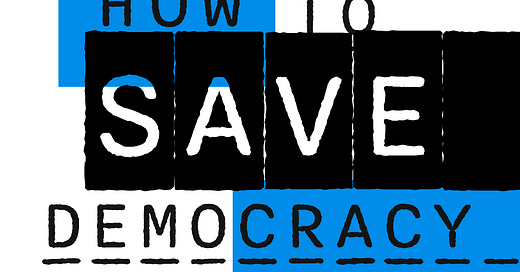My Dear Friend of Democracy,
Today’s letter is about how quickly democracy can reach a dead end.
I’ll illustrate this using two countries as an example.
The first is Bulgaria.
Bulgarians have faced six national elections in just over two years. Most people no longer go to the ballots and are turning away from politics.
How could it come to this?
In Bulgaria, two large blocs are irreconcilably opposed, but neither has a majority.
On the one hand, there is the GERB party, which has governed for decades and stands for corruption and stagnation. On the other hand, there is a movement that stands for change, which manifests itself mainly in two parties: the We Continue the Change party and the Movement for Rights and Freedoms. There are also left-wing, populist and extreme parties. In total, neither side manages to form a majority. The one-time attempt to cooperate with a united government failed in the spring of this year.
Now, after the sixth election, there is once again no government majority in sight. The unpleasant alternatives are, therefore, a seventh election or a minority government, maybe with Bulgaria's largest pro-Russian far-right party, Vazrazhdane (Revival), that wants to set up a referendum on leaving NATO and rejecting the euro.
Democracy is at an impasse in Bulgaria.
The second example is from my home country, Germany.
There will be three state elections in Germany in autumn this year. In Brandenburg, Saxony and Thuringia.
It is possible that after the elections, the partly right-wing extremist Alternative for Germany (AfD) and the Sahra Wagenknecht Alliance (BSW) will together have more than 50 per cent of the seats in one or two of the three state parliaments.
What then?
The two extreme parties, AfD and BSW, will (fortunately) not join in forming a government. They see themselves as too different (although, in some respects, they are not that far apart, but, hey, please don't tell them). The only option left is for parties from the centre to cooperate with AfD or BSW. If not, politics will no longer be able to act.
Democracy will then be at a dead end in Germany, too.
What do the examples from Bulgaria and Germany have in common?
In both cases, it is not possible to form a majority.
But democracy only functions when majorities are found. If there are three parties in a country, and each party has a third of the population behind it, and if the differences of opinion between the parties are so significant that cooperation is not possible, then democracy doesn't work. It's that simple.
What can be done?
Some advocate for implementing a mechanism to ensure that majorities are generated "automatically", for example, by increasing the number of seats in parliament for the party with the most votes relatively so that it would have an absolute majority.
Italian Prime Minister Giorgia Meloni is currently attempting such a reform. Under this reform, the election winner would automatically receive 55 per cent of the seats in parliament.
But would that still be a democracy? Politics would then be able to act, but people's opinions would no longer be reflected in politics in proportion to their presence in the population. Plus, the power of such an upgrade of one party could be used for many reasons. Democracy would then no longer be at a dead end but could be abolished at all.
Is there an alternative?
Only one. Compromises.
Parties must come together to form majorities in parliament or to form a government. They must do this in a way that allows all government parties to realize parts of their agenda. But, of course, only parts. So, every side must (be able to) make compromises.
The former German Chancellor Helmut Schmidt once said:
"Democracy lives from compromise. Anyone who cannot make compromises is of no use to democracy."
✊ In the end, such a policy of compromise will only succeed if we, the citizens, accept it; if we do not vote out parties because they have only been able to implement parts of their promises when in government. That is not a breach of election pledges. That is democracy.
See you in Europe,
Johannes





Good read 👏